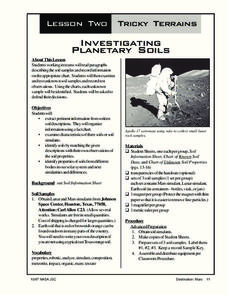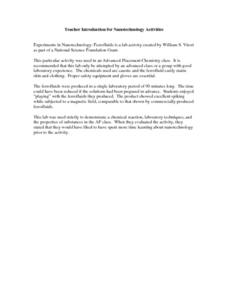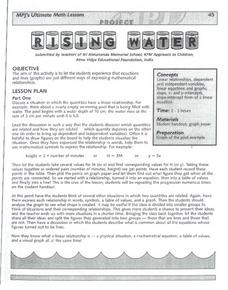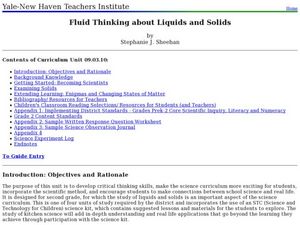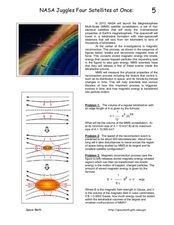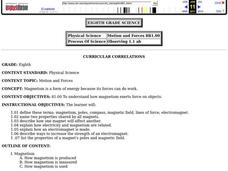Curated OER
Area, Arithmetic and Algebra
Students model formulas for rectangles and squares. In this area, arithmetic and algebra lesson, students explore the formula for the area of squares and rectangles. They use squares to model the formula for the area and identify...
Curated OER
Ionic Compounds
In this compounds worksheet, high schoolers review the structure and properties of ionic compounds, their formulas and nomenclature, and molecular mass and percentage composition. This worksheet has 4 short answer questions and 7...
Cornell University
Classification
Explore the scientific method of classification. An interactive activity asks learners to create a classification system for a group of objects and develop a flow chart to communicate their systems. In addition, individuals use a...
Teach Engineering
Fun With Nanotechnology
Introduce your class to nanotechnology applications with three demonstrations that showcase scientific principles related to ferrofluids, quantum dots, and gold nanoparticles. Groups will work more closely with these applications in the...
Exploratorium
Indicating Electrolysis
Sure, your learners know water is made up of two molecules, but watching them separate helps the class see the construction like never before. This resource provides directions on how to build a simple electrolysis device using a...
Urbana School District
Waves
What is a physicist's favorite part of sports? Doing the wave. The presentation covers longitudinal, transverse, surface, and standing waves. It includes in-depth information on frequency, wavelength, period, amplitude, reflection,...
Curated OER
Let's Think About Water
Students explore the different forms that water can take and conduct simple experiments to demonstrate some of its properties in each state. They watch a short video that illustrates some of these concepts.
Curated OER
Investigating Planetary Soils
Students study soil characteristics and identify properties of soils from different parts of the solar system. In this soil instructional activity students divide into groups, read soil descriptions, test and record soil samples.
Curated OER
Ion (Derstand) Bonding through Energy Level Diagrams
Ninth graders investigate ionic bonding through energy level diagrams. In this ion bonding lesson plan, 9th graders observe demonstrations to show energy level diagrams using magnets to represent the subatomic particles. Students fill...
Curated OER
Minerals of the Earth
Students learn and practice identifying Earth's minerals and their properties. Working in small groups, they evaluate minerals. This is a well-described lesson, which students enjoy.
Curated OER
Experiments in Nanotechnology: Ferrofluids
Students explore the world of nanotechnology by synthesizing ferrofluids in a series of chemical reactions. In small groups, they follow the procedure to create the ferrofluids using precise measuring techniques. They test the resulting...
Curated OER
Rising Water!
Students observe water change from a liquid to a gas state when heated and then return to its liquid stage when cooled. They learn that gas molecules move faster than liquid molecules. They discover physical properties that describe how...
Curated OER
The Physics of Toys
Students explore physics by experimenting with classic toys. For this physical science lesson, students utilize gliders, energy balls, bouncing balls, marbles and other toys to explore how they work. Students explore each toy at a work...
Curated OER
Pet Rocks
Students complete a variety of activities related to the physical characteristics of minerals. They classify and group candy, classify rocks and complete a Pet River Rock worksheet. Students try to guess which rock goes with each...
Curated OER
Secrets of Making Money
Students examine the properties of different materials used to make paper money. They design their own bill and share it with the class. They also watch a video clip and read an article about making money and how it affects the economy.
Curated OER
Fluid Thinking About Liquids and Solids
Second graders examine the physical characteristics of the different states of matter. In this chemistry lesson, 2nd graders observe how matter changes from one phase to another. They classify substances according to its type of matter.
Cornell University
Nano Interactions
Tiny particles can provide big learning opportunities! Middle school scientists explore the world of nanoparticles through reading, discussion, and experiment. Collaborative groups first apply nanotechnology to determine water hardness....
Curated OER
NASA Juggles Four Satellites at Once
In this NASA satellites activity, students read about the Magnetosphere Multi-Scale satellite constellation that NASA will launch in 2013. They solve 4 problems including finding the volume of the MMS constellation, finding how long it...
Curated OER
Machines: Designing Form and Function
Students design a boat model with simplified steam engine. In this ecology lesson, students compare renewable and nonrenewable energy sources. They determine the efficiency of their boat model.
Curated OER
Properties of Earth: Word Search
In this word search instructional activity, students search for words related to the Earth, the sun and it's movements. Terms include seasons, features, and movements.
Curated OER
Motion and Forces
Eighth graders define the terms: magnetism, poles, compass, magnetic field, lines of force, electromagnet. They name two properties shared by all magnets and describe how one magnet will affect another.
Curated OER
Mineral Identification
Students identify minerals from its physical properties accomplished through observation and testing of the minerals involved. They divide into groups and perform the physical property tests listed on the Mineral Background sheet.
Curated OER
Metals, Non-Metals, Metalloids
Students describe properties of various elements. They arrange the elements based on properties in order to explain the organization of the periodic table. They label elements as metal, non-metal, or metalloid.
Curated OER
Multiplication and Division with Arrays
Young scholars practice the commutative property, create and manipulate arrays and multiply and divide numbers.









